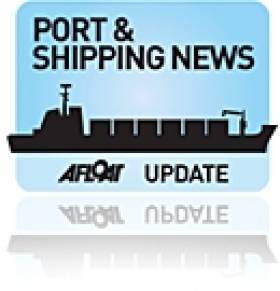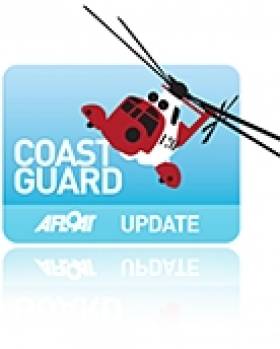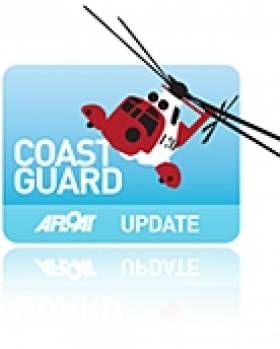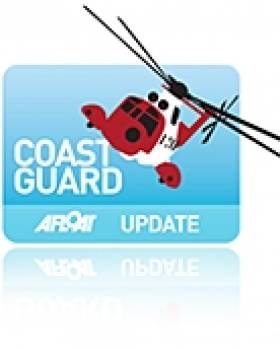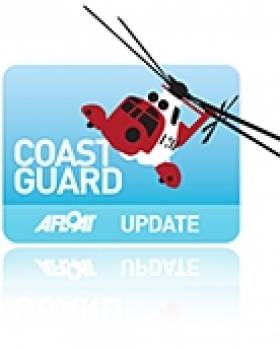Displaying items by tag: Leo Varadkar
Canoeist Darragh Clarke Honoured for Gold-Medal Performance
#Canoeing: The Taoiseach, Leo Varadkar, has honoured wildwater canoeist Darragh Clarke for his achievement in taking gold at the junior European Championships in Macedonia. The 18-year-old from Chapelizod was invited to meet the Taoiseach at Government Buildings.
Clarke took a silver medal at the junior world championships in Austria in 2017. Though he can compete for the rest of the year as a junior – he will take on the Liffey Descent on September 15th – he says he is already preparing to campaign in the under-23 ranks.
#ports – The Cabinet has approved the draft General Scheme of a new Bill with important implications for Ireland's vital port sector, Minister for Transport, Tourism & Sport Leo Varadkar has announced. The Harbours (Amendment) Bill 2014 will allow the five designated Ports of Regional Significance in Drogheda, Dún Laoghaire, Galway, New Ross and Wicklow to transfer to local authority ownership at a future date, in line with Government policy to strengthen local government.
These five ports play an important role through tourism, leisure amenity, and regional trade. The Government has decided that their future is best secured under strong local governance.
The draft legislation builds upon Minister Varadkar's ongoing reform of the State commercial ports sector as announced in last year's new National Ports Policy.
"This is an important Bill for the ports sector, which plays a major role in the Irish economy. The National Ports Policy encourages each port, whether small or large, to develop its full potential to ensure that they can all contribute to further growth in the ports sector. Transferring the five regional ports to local authority management at a future date will be the best way to protect their future and ensure good governance," Minister Varadkar said.
Sea-borne freight through Ireland's ports sector accounts for 84% of Ireland's trade in volume and 62% in value terms. Many of Ireland's major exporting sectors such as pharmaceuticals, chemicals and food rely heavily on sea transport.
The Bill will also introduce higher standards for appointments to the boards at Ireland's largest port companies at Dublin, Cork, Shannon Foynes and Waterford. It will set out specific skillsets for potential appointees, introduce term limits and make it a legal requirement for Chairmen-designate to appear before the relevant Oireachtas committee prior to their appointment. This is already a non-statutory Government requirement.
The draft Bill will now be sent to the Joint Oireachtas Committee on Transport & Communications for detailed consideration by all its members.
Details of draft Bill
The main purpose of the Bill is to provide the necessary amendments to allow for a later transfer of the five designated Ports of Regional Significance - Drogheda, Dún Laoghaire, Galway, New Ross and Wicklow - to local authority ownership
The Bill provides for flexibility in the form of the actual transfer, which may be a transfer of Ministerial shareholding in the existing company, or a dissolution of the company structure and full integration within local authority structures.
The second major theme of the Bill is to further improve the board selection and appointment process to the Ports of National Significance at Dublin, Cork, Shannon Foynes and Waterford such as by specifying certain required skillsets, introducing term limits and requiring Chairpersons designate appear before the relevant Oireachtas committee prior to appointment.
Sports Minister Wants to Know How Grant Money is Spent
#budget – In a week that saw Sports Council Grants hit in the budget, it is still unlcear as to how this might affect Irish sailing, a sport that benefitted from a range of state support to the tune of €1.2 million in 2012.
Writing in today's Sunday Independent newspaper John Greene reminds that Sports Minister Leo Varadkar has said publicly three times in recent weeks that he wants to see how money is spent by Ireland's sports associations. Greene says it is thought there remains a level of dissatisfaction that some of the national governing bodies for sport remain rooted in old habits and are not providing value for money, a frustration shared by the sports council.
A statement from the Federation of Irish Sports (FIS) on behalf of Sport in Ireland said it was disappointed with the announcement which sees a further 8% reduction in current funding for Irish Sport with funding to the Irish Sports Council believed to be in the region of €40 million for next year – a reduction of approximately €3 million on 2013. This is the funding that enables over 100 Irish Sports organisations to run sports development programmes essential to delivering sporting opportunities to all, provide much needed support to grassroots clubs and volunteers as well as providing assistance to our international athletes.
This is the sixth year in a row for cuts – investment in sport already having fallen by some 25% – and now sees Irish Sport back to 2006 levels of support. This is particularly damaging given that consistent government investment in sport only commenced in a meaningful way in 1999 and broke the €30 million barrier for the first time in 2004.
Sports council grants are an an important funding component for the Irish Sailing Association. In 2013 affiliated clubs and organisations secured €251,719 and the ISA has recently sought further applications despite the 8% funding cut now signalled for 2014.
Government grants for sailing include olympic sailing, grants for hosting events and capital grants for clubs and associations.
In October 2012, Irish sailing got the biggest grant of all sports bodies for 'Mobile Training Fleets'. Minister of State for Tourism & Sport Michael Ring approved a grant of €400,000 for sailing, the biggest of all grants awarded to 22 national sports bodies to buy new equipment and boost participation in sports and improve performance.
The sailing grant which was 15% of the total payout was awarded for "mobile training fleets, transport vans, coach boats, coaching equipment, Olympic sailing equipment and training camp equipment (excluding eyewear)."
The Irish Sailing Association (ISA) says the funds were spent on coaching equipment including coach boats, vehicles and training equipment, Olympic sailing equipment including a fleet of 420's, Laser Radials and a 49er with associated spares for training camps and training camp equipment which includes strength and conditioning apparatus to be used on training camps.
The ISA also funded for four mobile training fleets for use on introductory ISA training programmes. The aim is to provide support for organisations looking to develop junior, schools and introductory adult programmes.
Irish Coast Guard To Be Merged With Marine Survey Office
#Coastguard - The Irish Coast Guard is to be merged with the Marine Survey Office, as The Irish Times reports.
Cabinet approval has been granted for Transport Minister Leo Varadkar's reorganisation plans, which will see the creation of a new body - the Irish Maritime Administration - that would be responsible for both services.
The changes come a year after the publication of the 'value for money' report commissioned by the Department of Transport to identify where efficiencies could be achieved in Ireland's maritime services.
Among a series of changes intended to shore up the State's maritime safety strategy, the merger will also reportedly see coastguard radio staff reduced from three-man to two-man watches - although Minister Varadkar has denied there will be any staff shortages.
The Irish Times has much more on the story HERE.
Tit Bonhomme 999 Concerns Will Be Considered Says Varadkar
#TitBonhomme - Transport Minister Leo Varadkar says he will consider concerns over the handling of emergency calls relating to the Tit Bonhomme tragedy, as The Irish Times reports.
The minister commented after a meeting last week with the widow of the stricken boat's skipper Michael Hayes in Union Hall in West Cork.
Hayes and four of his five-man crew lost their lives when the trawler went down after striking rocks at the mouth of Glandore Harbour. The only survivor was Egyptian fisherman Abdelbaky Mohamed, who was able to swim to shore.
The recent inquest into the incident criticised the handling of 999 emergency calls from the fishing boat prior to its sinking, as it emerged that neither the Irish Coast Guard nor the Marine Casualty Investigation Board were aware that not one but two calls were made by crewman Kevin Kershaw.
It emerged during the inquest that the coastguard was only notified of the event on the second call, three minutes after the first.
Barrister Elizabeth O'Connel, who represented Hayes' widow Caitlín Uí Aodha at the inquest, described the dearth of details taken by the operator on the first call as "extraordinary".
Ireland's emergency call service, operated by BT Ireland from three locations, is currently under review by the Department of Communications.
The Irish Times has more on the story HERE.
Irish Harbours Get €7.4m Funding for Remedial Works
#IrishHarbours - Funding of €7.4 million for urgent remedial works at six regional harbours has been announced by Minister for Transport, Tourism & Sport Leo Varadkar.
The funding will pay for repairs and safety works on essential harbour infrastructure, and is likely to benefit the local economy, promote leisure activities and support the fishing industry.
“This funding will allow essential works at these regional harbours on piers, walls and harbour structures," said the minister. "This work is necessary as part of their transfer from central Government to local authority control.
“Harbours play an important role in their communities in terms of fishing, cargo and leisure and play an increasingly important role in tourism and watersports."
Minister Varadkar added: "The large-scale safety or construction projects planned for Kinsale, and for Baltimore & Skibbereen Harbour this year will be able to go ahead thanks to this funding. Smaller scale projects at other harbours can also proceed, including essential works at Arklow Harbour.”
The funding has been allocated to the following harbours:
Arklow - €3,588,000
Baltimore & Skibbereen - €1,165,000
Bantry Bay - €100,000
Kinsale - €1,467,000
Tralee & Fenit - €750,000
Wexford - €329,500
The funding has been concentrated on remedial works to ensure that the harbours are in a fit condition during their transfer to local authority control.
Twelve of the 13 regional harbours have transferred to date, with 11 being taken over by local authorities, and one designated a fisheries harbour.
Minister Approves New Coastguard Station for Doolin
#Coastguard - Minister for Transport Leo Varadkar has given approval for the construction of a new volunteer coastguard station in Doolin, Co Clare.
The €1.8-million project, to be overseen by the Office of Public Works, will be tendered within a matter of weeks, with construction expected to start in early April.
The Doolin unit of the Irish Coast Guard is one of the busiest in the country and operates a cliff rescue team, a boat unit and shoreline search team. The 24-member team is supported by seven additional volunteers located on nearby Inisheer.
The unit was featured on the recent RTÉ programme Ireland’s Search & Rescue conducting cliff and boat rescue operations.
Volunteers currently operate out of a temporary premises and a nearby rented farm shed. The new station will provide a garage area for the storage of boats, cliff rescue, personal equipment and transport as well as changing facilities and an operations room.
Minister Varadkar said: "I am delighted to be able to confirm funding for the new Doolin coastguard station. I am very conscious of the demands placed on the unit and I am keen to provide them with a base to so they can continue to serve their community and the many visitors to the Doolin area, including the Cliffs of Moher.
“In both 2012 and 2011 the Doolin unit responded to over 40 call-outs each year. This is a long-term investment in the Doolin area and acknowledges the efforts and service that the volunteers continue to provide.”
The Doolin coastguard unit is currently awaiting an update on long-delayed plans to redevelop the pier facilities at Doolin, which rescuers argue are "regularly over-congested" in peak tourist periods - though the current plans face opposition from local surfers who fear a negative impact on the renowned Crab Island surf break in the area.
Vessels Registration Bill To Be Passed in 2013 Says Minister
#Registration - Minister for Transport Leo Varadkar has surprised Ireland's sailing and boating community by announcing the passing of a Vessels Registration Bill as a priority for 2013.
The proposed legislation is among five transport bills included in the minister's priorities for the year ahead, as published by his department yesterday.
Stakeholders are currently awaiting confirmation from the minister as to the contents and scope of the bill, which would be put forward for public consultation before being published at some point this year.
Legislation for the registration of vessels as been in drafting stages for a number of years, and submissions have been received by previous Governments relating to areas the bill would likely cover such as insurance, VAT avoidance and identification of vessels for search and rescue purposes.
According to a source close to Afloat.ie, among the proposals for the bill is that any vessel entering UK and Ireland waters must inform the coastguard of the names of their passengers and the port of arrival.
"Without boat registration, that is a near impossible task to manage," said the source.
Almost all other EU countries have boat registration legislation except for the UK and Ireland – and pressure is being applied in Britain to bring such registration into law through the UK Border Agency.
Among the stakeholders broadly in favour of vessel registration is the Irish Marine Federation (IMF), which has long called for a mandatory State scheme for identifying recreational vessels in Ireland.
At present all registration of vessels of all sizes, from small sailing boats to container ships, is conducted under the Register of Shipping Act 1955.
Valentia and Malin Head Coastguard Stations Will Not Be Closed Says Minister
#COASTGUARD - BreakingNews.ie reports that the coastguard stations at Malin Head and Valentia will remain open, following a statement to the Dáil by the Minister for Transport this evening.
Coastal communities in Donegal and Kerry had been protesting against plans to close their respective Irish Coast Guard radio stations in the wake of the 'value for money' report commissioned earlier this year by the office of Transport Minister Leo Varadkar.
Both stations were earmarked for potential closure amid concerns that the minister was allegedly looking at an "alternative technical solution" within his own constituency in Blanchardstown.
However this evening Minister Varadkar assured local communities that their coastguard centres would not be closed, while also expressing disappointment at the treatment of officials from his department at a recent joint committee meeting on the matter.
Meanwhile, the Save Our Station campaign group at Valentia has welcomed the news, telling RTÉ News that "common sense has prevailed".
Spokesperson Anthony O'Connell said that he hoped the minister's move marked the end of any threat to the future of the stations at Valentia and Malin Head.
The news comes just two weeks after an East Londonderry MLA sought the support of Northern Ireland's Minister of State to protect the Malin Head station from the chop.
MLA Seeks NI Minister's Support for Malin Head Coastguard
#COASTGUARD - An MLA for East Londonderry has sought the support of Northern Ireland's Minister of State to protect the Irish Coast Guard station at Malin Head from closure.
Inishowen News reports that the SDLP's John Dallat MLA contacted Mike Penning regarding the threat looming over the Donegal coastguard station, which is the most northerly on the island of Ireland.
Dallat said: “When Mike Penning was Minister for Transport in Westminster he was instrumental in keeping the coastguard station at Bangor, Co Down, open, and he made his judgement on the basis that Bangor had a special working relationship with Malin Head which was critical to ensuring there was a complete coverage of all areas."
“It would be ironic now if Malin Head, which saved Bangor, was itself to be victim of closure. That must not happen and I believe Mr Penning’s support is an important element in this campaign which must not fail."
As reported recently on Afloat.ie, coastal communities in both Donegal and Kerry have been protesting plans to close the stations at Malin Head and Valentia in the wake of a 'value for money' report commissioned by the Republic's Minister for Transport Leo Varadkar.
Coastguard chiefs have criticised the studies conducted by consultants Fisher Associates into the IRCG and the Marine Survey Office.
Inishowen News has more on the story HERE.



























